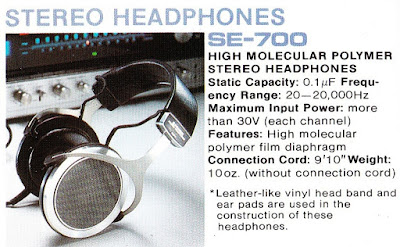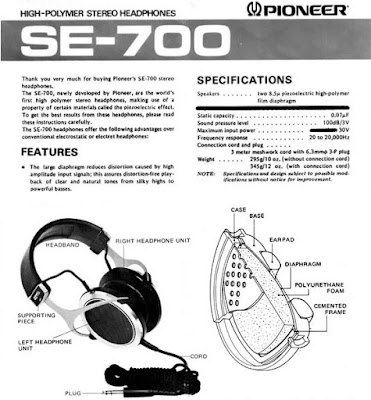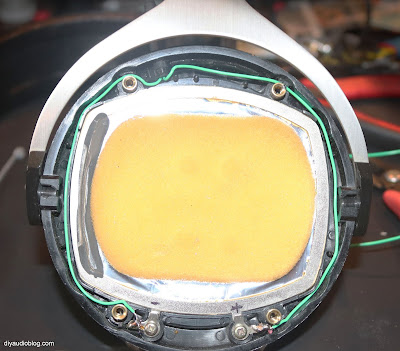The Pioneer SE-700 were the company’s flagship headphones released back in 1974. The driver is an unusual piezo-electric type. I am personally not aware of any other headphone manufacturer that offered this type of driver, but feel free to share in the comments if you know of one. The SE-700, SE-500 and SE-300 all use a similar element.
 |
An old advert for the SE-700 touting their specs |
I’d describe the sound as airy, crisp, and similar to an electrostat
with a detail emphasis. Bass quantity is very low, which I believe is typical
of this type of driver. The simple metal frame and gimbals look rather elegant,
and the overall unit is pretty light. The way it rests on the head is slightly
odd compared to modern headphones, but it’s still very usable.
The piezo-electric driver is a very thin piece of metal foil with a frame going around the perimeter, with the positive and negative connections at the bottom. It is covered with bright yellow foam resembling a dish sponge. It is also quite delicate, so even opening the headphone can damage the driver. The unit is sealed shut with rubber cement or a similar adhesive so it must be opened very slowly and carefully to access the inside.
 |
An image from the user's manual circa 1974 |
If you’re looking to purchase one of these you can keep an
eye out on Reverb, eBay or similar platforms. Price for a good example will
generally be between $80 and $150. You’ll probably want to replace the wiring
including the 3-meter cloth-covered cable, and the vinyl headband and ear pads
which will likely be flaking.
My client Steve who sent me the headphones had already
replaced the pads and requested the inner wiring be replaced. The existing wiring contacts had been
twisted together and covered with heatshrink (see above image), which seemed like an odd
manufacturing choice and not an ideal connection. Running single strands from
the connection would sound better. You’ll note both sides of the headphone
below after the cabling was replaced.
The headphone was reassembled using 3M double-sided tape so it can be more easily opened if needed. Steve will be crafting a calfskin headband for the unit as a replacement for the original vinyl headband, which I feel is the only visual let-down. It appears EricJ from HeadFi created an excellent tutorial back in 2007 on creating a replacement headband which you can find here. Below you'll see the refurbished/modded unit.
I hope you enjoyed this post on one of the more interesting vintage headphones out there. If you have a headphone that needs a cable upgrade please be sure to visit Zynsonix.com.
Disclosure: Please remember that using a soldering iron and/or modifying headphones can be dangerous to you and/or your surroundings and should only be performed by a certified technician. The owner of this blog and all associated parties can not / will not be held responsible if you attempt a modification posted above and cause physical harm to yourself or your surroundings.











Thanks for posting that, I just got my hands on old SE-700 over christmas when cleaning our attic (my brother almost got rid of them). I usually use the Philips Fidelio X2 and love them, but the SE-700 sound much clearer and show so much more detail albeit their age. I found a Pioneer JB-21 switch box on ebay for 1€ and am running them over this thing after I read something about it online. Sound amazing!
ReplyDeleteI changed the worn-out earpads with a pair of Shure replacement pads that fit, a bit larger but ok.
My problem is that both sides, especially the right one, kinda come and go at times. They are still there but lose in volume. Can you guess if rewiring would help, or if the Piezo drivers are damaged?
Hi Patrick, glad you got a pair to enjoy. That behavior is strange, have you tried shimmying the connections when it happens to see if the sound cuts in and out? Also I've had some vintage switches that have gone bad with sporadic high resistance, so I'd be looking at that first. Check it with a multimeter to see if the resistance is any more than a fraction of an ohm.
ReplyDeleteWith Shimmying you mean wiggling the cables? I tried and that never made a difference, was also my first guess.
DeleteWhat does help though if I adjust the balance or volume on the Amp to compensate the lower volume, give it more power. Then sometimes they just pop in again to normal, so I can turn back the balance wheel to neutral.
The phenomenon showed also when I ran them directly on my Asus Xonar Essence Sound Card (it has a powerful 600 Ohm headphone amp). I first thought that the small electronics of the card couldn't handle the unusual (capacitive) load of the piezo headphones, so I got the box at the speaker amp, but the behaviour is the same.
Can worn-out old soldering points cause a voltage drop that would create such a behaviour? But I should check the switch as well, my old 10€ multimeter didn't show anything, I guess it's time to buy a good one anyway.
Odd, it's almost as if you have a relay where it requires a certain amount of current to kick over. Reflowing the joints couldn't hurt, just note to open the headphone very slowly to not rip the foil. Also check the resistance from the driver posts to the end of the cable, see if there is excess resistance there.
ReplyDeleteI'd recommend posting this info at DIYAudio.com, there are many people far more knowledgeable than I that might have a better frame of reference.